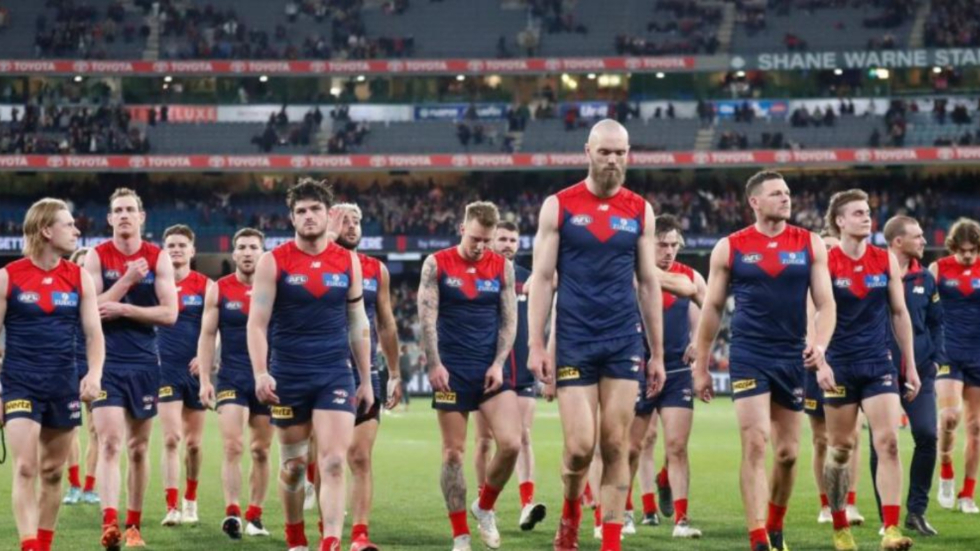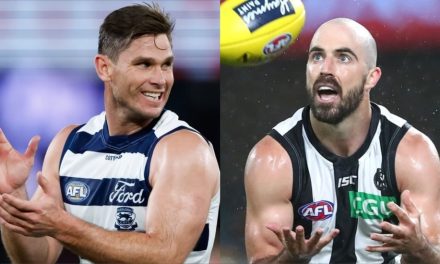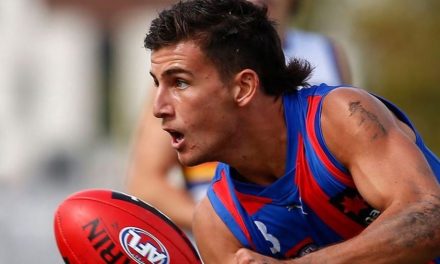A dejected Melbourne leaves the MCG after last Friday night’s semi-final loss to Brisbane. Photo: AFL MEDIA
During an on-field interview in the aftermath of Brisbane’s Friday night triumph over Melbourne, the brilliant Jarrod Berry shared with us one of his coach Chris Fagan’s favourite mantras: “You never lose, but you always learn.”
Berry felt that approach helped the Lions come back from a 28-point deficit against the reigning champs while also guiding them through the past few weeks as the rest of the competition looked elsewhere for genuine flag prospects.
Now their vanquished opponents would do well to heed Brisbane’s philosophical message as they contemplate the off-season ahead.
For better or worse, mostly worse, we live in a “what have you done for me lately” universe from which the AFL isn’t immune.
In this world, past deeds are cool and worthy of praise, yet this world is desperate for its next distraction, obsessed with what’s new and shiny, and it’s a world in which Melbourne has been given a crash course over the past few months.
In Melbourne’s case, those past deeds were significant. The Demons’ 57-year drought-breaking 2021 premiership was achieved in such utterly devastating fashion that the rest of the league couldn’t help but look on aghast as the Demons bulldozed their way through September, winning their trio of finals by a combined 28 goals.
Yet separating themselves so comprehensively from the rest meant every other team went about carefully plotting Melbourne’s demise, sealed by the Lions on Friday night.
While Melbourne carried its devastating premiership winning form into the first half of this season, bolting to a 10-0 start, much of its destruction was at the hands of opponents who ranged from OK to god-awful, providing a skewed version of just how dangerous they truly were.
In fact, the moment the Demons encountered a genuinely good team, which they did in Round 11 against Fremantle, they were ripped apart on the MCG, as they were a week later against Sydney at the same venue.
Over the course of the season Melbourne went 0-5 against top-four teams, joining Adelaide, North Melbourne and GWS as the only clubs that failed to notch a single top-4 scalp.
Both Fremantle and Sydney provided the “rope a dope” blueprint for the rest of the AFL to follow, and which Brisbane borrowed from liberally on Friday night.
PLEASE HELP US CONTINUE TO THRIVE BY BECOMING AN OFFICIAL FOOTYOLOGY PATRON. JUST CLICK THIS LINK.
Successful Demon conquerors have demonstrated in 2022 that if you can withstand Melbourne’s patented ferocity and subsequent early inside 50 dominance without being overwhelmed, the Demons are ripe for the picking in the second half of matches, with simply nothing resembling a “Plan B” in the reigning champ’s toolkit.
Throughout the home and away season, Melbourne demonstrated its devastating early game prowess, compiling an 18-4 record and posting a 153.7 percentage in the first half of games (both league-best figures) yet clearly running out of steam and ideas in the second, registering a more modest 12-10 record along with an 111.1 percentage.
If you can hang with the Demons long enough, they’ll wilt, which is exactly what the Lions proved definitively in their semi-final win.
Melbourne took a 22-point lead into the half-time break, earnt largely off the back of a typically brutal plus-23 contested possession edge, along with an extra eight extra inside 50s.
Yet Melbourne had thrown not only its best punch, but its only one, looking weary and uninspired in the second half as Brisbane raised its level of intensity, ultimately whizzing by a team in desperate need of tactical and spiritual guidance.
Prior to Melbourne’s round 11 loss to the Dockers, the Demons had lost just four of their previous 37 matches. In that time, they had clearly found a style of football that worked perfectly and which had left the bulk of the competition shaking in their boots.
However, all that winning meant they never had to look in the mirror and develop contingency plans. They’d become increasingly comfortable in their own skin, reflected at the selection table, too, where Melbourne utilised a league-low 33 players all season despite having a dominant VFL team at arm’s reach and despite all of its second half concerns.
When Simon Goodwin and the Melbourne brains trust tune in to this week’s preliminary finals, they’ll see four teams who have completely re-invented themselves in recent times and who have all had to work both body and mind to climb within two wins of a premiership.
Melbourne can no longer get by with ferocity alone. The Demons were dwarfed from a tactical perspective this season, and in the end their stubbornness might have cost them another flag.
If they aren’t prepared to hit the books as well as the gym this off-season, they’ll have to once again get used to the role of observer rather than an active September participant.











